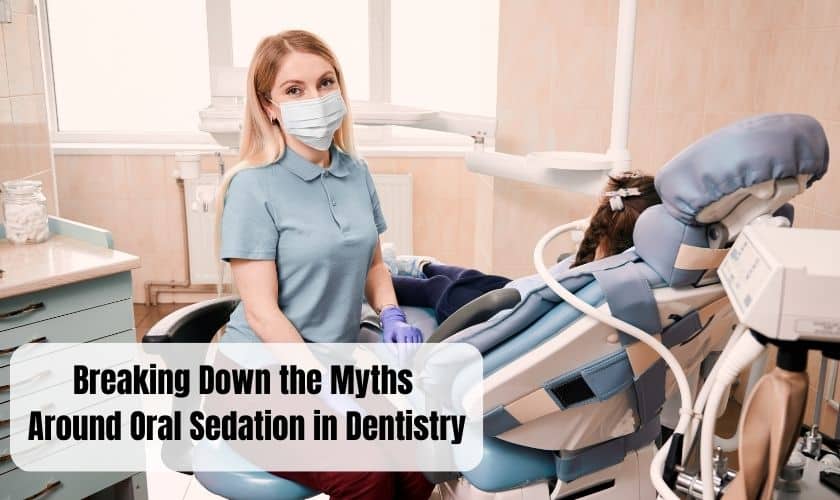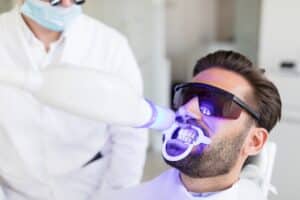Are you afraid of visiting the dentist? Do you feel anxious at the mere thought of sitting in a dental chair? Well, it’s time to break down some common myths and misconceptions about oral sedation in dentistry. Contrary to popular belief, sedation does not involve putting patients completely under anesthesia or rendering them unconscious. Instead, it is a safe and effective way to help patients relax during even the most complex dental procedures. In this blog post, we’ll explore some of the most common myths surrounding oral sedation and debunk them once and for all!
If you’re one of the many people who get anxious at the mere thought of going to the dentist, you may have considered oral sedation. Oral sedation dentistry is a safe and effective way to reduce anxiety and help patients feel more relaxed during dental procedures.
However, there are a lot of myths and misconceptions about oral sedation, which can make people hesitate to try it. In this blog post, we’ll be breaking down some of the most common myths around oral sedation in dentistry.
Myth #1: Oral Sedation is Only for People with Severe Dental Anxiety
One of the most common myths about oral sedation is that it’s only for people with severe dental anxiety. While it’s true that oral sedation can be particularly beneficial for those with dental anxiety, it’s not limited to them.
In fact, oral sedation can be helpful for anyone who wants to feel more relaxed during their dental appointment. Oral sedation may be an option worth considering whether you have mild or severe dental anxiety.
Myth #2: Oral Sedatives are Dangerous
Another common myth about oral sedation is that it’s dangerous. This simply isn’t true. When used as directed by trained professionals, oral sedatives are safe and pose very little risk. Dentists undergo special training in order to administer oral sedatives safely and effectively.
Myth #3: Oral Sedatives Will Make You unconscious or “knock
What is Oral Sedation?
When it comes to oral sedation for dental procedures, there is a lot of misinformation out there. Let’s break down some of the myths around oral sedation so you can make an informed decision about whether or not it’s right for you.
myth #1: Oral sedation is the same as being asleep.
fact: Oral sedation will relax you, but you will still be awake and able to communicate with your dentist.
myth #2: Oral sedation is dangerous.
fact: Oral sedation is very safe when used as directed by a trained professional. The most common side effect is drowsiness, which is why it’s important to have someone drive you home after your appointment.
myth #3: Only people with a high pain tolerance need oral sedation.
fact: Anyone can benefit from oral sedation, regardless of their pain tolerance. It’s especially helpful for people who have anxiety about dental procedures or who have a sensitive gag reflex.
Benefits of Oral Sedation
When it comes to oral sedation in dentistry, there are a lot of myths and misconceptions floating around. But the fact is, oral sedation is a perfectly safe and effective way to help patients relax during dental procedures. Here are just a few of the many benefits of oral sedation:
1. Oral sedation is very effective in helping patients relax during dental procedures.
2. Oral sedation is much safer than general anesthesia, which carries a risk of serious side effects.
3. Oral sedation is relatively inexpensive compared to other forms of sedation dentistry.
4. Oral sedation allows patients to remain awake and aware during their dental procedure, which can be helpful for those who experience anxiety about being put under anesthesia.
5. Oral sedation typically works very quickly, so patients can start relaxing as soon as they take the medication.
Myths and Misconceptions about Oral Sedation
One of the most common myths about oral sedation is that it will make you feel completely relaxed and pain-free. While oral sedation can help reduce anxiety and provide pain relief, it is not a guarantee that you will feel no pain or discomfort during your procedure.
Another common myth is that oral sedation is only for people with dental phobia or extreme anxiety. While it can be an effective way to manage these conditions, it is also suitable for patients who simply want to reduce stress and anxiety during their dental visit.
Some people believe that they will be unable to control their movements or reactions while under oral sedation. However, this is not the case – you will remain fully aware and in control of your body throughout the procedure.
Finally, some patients think that oral sedation is only used for lengthy or complex procedures. In reality, it can be used for any dental procedure, regardless of length or complexity.
Safety Considerations with Oral Sedation
When it comes to oral sedation, there are a few things you should keep in mind in order to help ensure a safe and successful experience. First, be sure to follow all of your dentist’s instructions. This includes not eating or drinking anything for at least six hours prior to your appointment. You’ll also want to make sure you have someone available to drive you home after your procedure, as the effects of the medication can last for several hours.
In addition, it’s important, to be honest with your dentist about any medical conditions you have or medications you are taking. This will help them determine if oral sedation is right for you and adjust the dosage accordingly. Finally, be sure to listen to your body and let your dentist know if you are feeling any discomfort during the procedure. Oral sedation can be a great option for those who are anxious about going to the dentist, but it’s important to be aware of these safety considerations before proceeding.
When to Consider Oral Sedation
If you experience anxiety or fear when visiting the dentist, you may be a good candidate for oral sedation. Oral sedation is a way to help you feel more relaxed during dental procedures. With oral sedation, you will take a pill before your appointment. The pill will make you drowsy and less aware of your surroundings. You will still be able to respond to questions and follow directions, but you may not remember much of the procedure afterward.
Oral sedation is safe and effective for most people. It is important to let your dentist know if you have any medical conditions or are taking any medications that could interact with the sedative. You should also plan to have someone drive you home after your appointment if you are going to be sedated.
If you have been putting off going to the dentist because of anxiety or fear, consider oral sedation as a way to make the experience more comfortable for you.
Conclusion
Oral sedation dentistry is a safe and effective way to manage anxiety during dental appointments. It is important to remember that oral sedation does not put you “to sleep”, but rather helps you relax so that the dentist can perform necessary treatments without causing undue stress or discomfort. Furthermore, it is crucial to understand all of the risks associated with this type of sedation before undergoing any treatment plan. By understanding these myths about oral sedation dentistry, we can be better informed when making decisions about our oral healthcare needs.
FAQs
Oral sedation works by helping to relax patients who may be anxious or fearful of dental procedures. The medication helps to reduce anxiety and fear, which can make the dental procedure more comfortable for the patient.
Yes, oral sedation is safe when it is administered by a trained and licensed professional. The medication used for oral sedation is typically very well tolerated by patients with no serious side effects.
The most common side effect of oral sedation is drowsiness. Other potential side effects include dry mouth, dizziness, nausea, and vomiting. These side effects are typically mild and resolve on their own within a few hours after the dental procedure.





